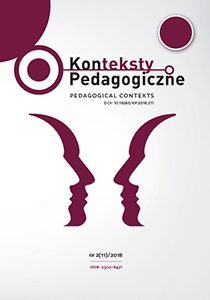Abstract
The use of multimedia is of particular importance in the teaching of a foreign language to medical school students, since mastering a language in artificial conditions, that is, outside the language environment of native speakers, requires creating situations that would stimulate communication in the target language. The use of information technologies in combination with the project methodology allows students to practice their knowledge and skills, and is one of the forms of organizing research activities that successfully implements coope-rative activities and motivation to learn a foreign language.
References
Banartseva, A.V. (2014). Multimedia technologies in the process of learning a foreign language for special purposes. Concept, 20, 136–140.
Baranova, N.A. (2013). Multimedia as a subject of didactic research. Concept, 3, 1–5.
Bryzhina, T.S. (2012). The use of multimedia in teaching English in a technical college. Linguamobilis, 2, 159–166.
Cherednichenko, G.A. (2014). Multimedia use to optimize the process of learning a business foreign language. Proceedings of St. Petersburg State University of Culture and Arts, 202, 114–118.
Ma, Q. (2007). From monitoring users to controlling user actions. A new perspective on the user-centred approach to CALL. Computer Assisted Language Learning, 20(4), 297–321.
Mayer, R.E. (2005). The Cambridge Handbook of Multimedia Learning. New York: Cambridge University Press.
Murphy, J.M. & Stoller, F.L. (eds.). (2001). Sustained-content language teaching. An emerging definition, TESOL Journal, 10, 3–5.
Rakhimova, A.E. (2012). Advantages of using computer technology in teaching for-eign languages. Foreign Languages at School, 10, 56–60.
Threlkeld, R. & Brzoska, K. (1994). Research in distance education. In: B. Willis (ed.), Distance education. Strategies and tools (p. 41–66). New Jersey: Educational Technol-ogy Publications.
Tsai, S.C. (2010). Developing and Integrating Courseware for Oral Presentations into ESP Learning Contexts. Computers & Education, 55(3), 1245–1258.
Vasilovskaya, V.N. (2008). The use of multimedia as one of the means of intensifica-tion of independent work in the study of a foreign language. News of the Southern Federal University, 4, 230–234.
In accordance with the recommendation of the Ministry of Science and Higher Education, which aims to counteract the practice of “ghostwriting” and “guest authorship,” all authors submitting their text for publication should attach an author’s statement which declares the contribution of each of the authors to the article. The printed and signed statement should be delivered by mail or other means to editor-in-chief Joanna Skibska or sent in the form of a scan to the following e-mail address: redakcja@kontekstypedagogczne.pl. The authors will not receive remuneration for publishing their papers. The editors reserve the right to make minor editorial changes to the articles which will not affect the substance of the article. We encourage all authors to prepare their articles in accordance with the guidelines for manuscript preparation. Download pdf file.
Authors transfer all copyrights and grant the journal the right of first publication with the work simultaneously licensed under a Creative Commons Attribution License that allows others to share the work with acknowledgement of the work's authorship and initial publication in this journal. All authors agree to the publishing of their email addresses, affiliations and short bio statements with their articles during the submission process.

